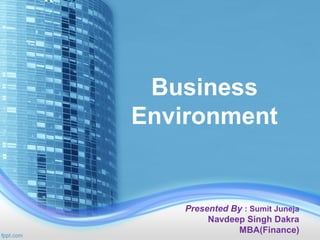W to
- 1. Presented By : Sumit Juneja Navdeep Singh Dakra MBA(Finance) Business Environment
- 3. About WTOAbout WTO Objective of WTOObjective of WTO Functions of WTOFunctions of WTO The WTO StructureThe WTO Structure Principles of WTOPrinciples of WTO Key Subjects in WTOKey Subjects in WTO Q & AQ & A
- 4. 4 About WTO The World Trade Organization (WTO) is the only global international organization dealing with the rules of trade between nations. At its heart are the WTO agreements, negotiated and signed by the bulk of the worldŌĆÖs trading nations and ratified in their parliaments. The goal is to help producers of goods and services, exporters, and importers conduct their business.
- 5. 5 Created by : Uruguay Round negotiations (1986-94)Created by : Uruguay Round negotiations (1986-94) Membership :153 countries (on 23 July 2008)Membership :153 countries (on 23 July 2008) Budget : 185 million Swiss francs for 2008Budget : 185 million Swiss francs for 2008 2007 Secretariat Staff : 6252007 Secretariat Staff : 625 Head : Director-General, Pascal LamyHead : Director-General, Pascal Lamy Established: 1 January 1995Established: 1 January 1995 Location :- Geneva, SwitzerlandLocation :- Geneva, Switzerland
- 6. Objectives Important objectives of WTO are mentioned below: (i) to implement the new world trade system as visualised in the Agreement; (ii) to promote World Trade in a manner that benefits every country; (iii) to ensure that developing countries secure a better balance in the sharing of the advantages resulting from the expansion of international trade corresponding to their developmental needs;
- 7. (iv) to demolish all hurdles to an open world trading system and usher in international economic renaissance because the world trade is an effective instrument to foster economic growth; ŌĆó (v) to enhance competitiveness among all trading partners so as to benefit consumers and help in global integration; ŌĆó (vi) to increase the level of production and productivity with a view to ensuring level of employment in the world; ŌĆó (vii) to expand and utilize world resources to the best; ŌĆó (viii) to improve the level of living for the global population and speed up economic development of the member nations.
- 8. 8 Functions of WTO (i) The WTO shall facilitate the implementation, administration and operation and further the objec┬Łtives of this Agreement and of the Multilateral Trade Agreements, and shall also provide the frame work for the implementation, administration and operation of the plurilateral Trade Agreements. (ii) The WTO shall provide the forum for negotiations among its members concerning their multilateral trade relations in matters dealt with under the Agreement in the Annexes to this Agreement. (iii) The WTO shall administer the Understanding on Rules and Procedures Governing the Settlement of Disputes. (iv) The WTO shall administer Trade Policy Review Mechanism. (v) With a view to achieving greater coherence in global economic policy making, the WTO shall cooperate, as appropriate, with the international Monetary Fund (IMF) and with the International Bank for Reconstruction and Development (IBRD) and its affiliated agencies.
- 9. 9 The WTO Structure Ministerial conferenceMinisterial conference SecretariatSecretariat Dispute Settlement BodyDispute Settlement Body General CouncilGeneral Council Director GeneralDirector General Trade Policy Review BodyTrade Policy Review Body
- 10. 10 The WTO Structure Committee On Budget Committee On T & D Committee On BoP Council for Service Council for Goods Trade relatedIntellectualPropertyrightscouncil
- 12. 12 The WTO Principles Rule Based Trading System Treatment For LDCs Competition On BoP Environment Protection Transparency Dismantling Trade Barriers Principles Of WTO MFN Treatment National Treatment Free Trade Principle
- 13. Should India Quit WTO ?
- 14. 14 WTO & Developing Countries
- 15. As in the Case of the Previous rewards, the developing countries, in general are dissatisfied with the outcome of the Uruguay Round* Do Developing Countries Suffer in the WTO System? -Special Consideration -Agriculture Trade Liberalization -Textiles Trade Liberalization -Service Trade Liberalization -Unequal Participation -Conclusion
- 16. 16 GATT & WTO
- 18. 18 Thank You


















